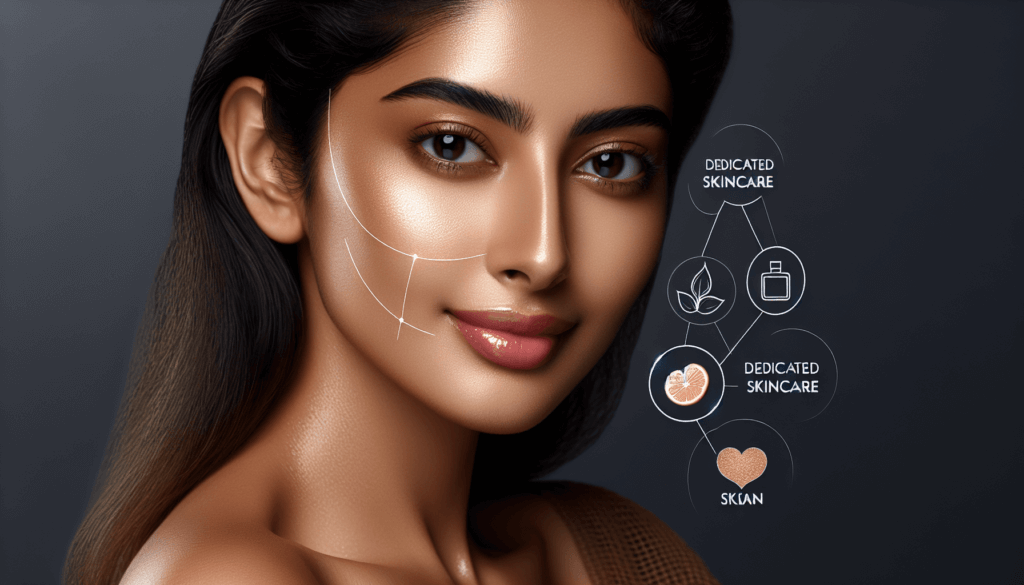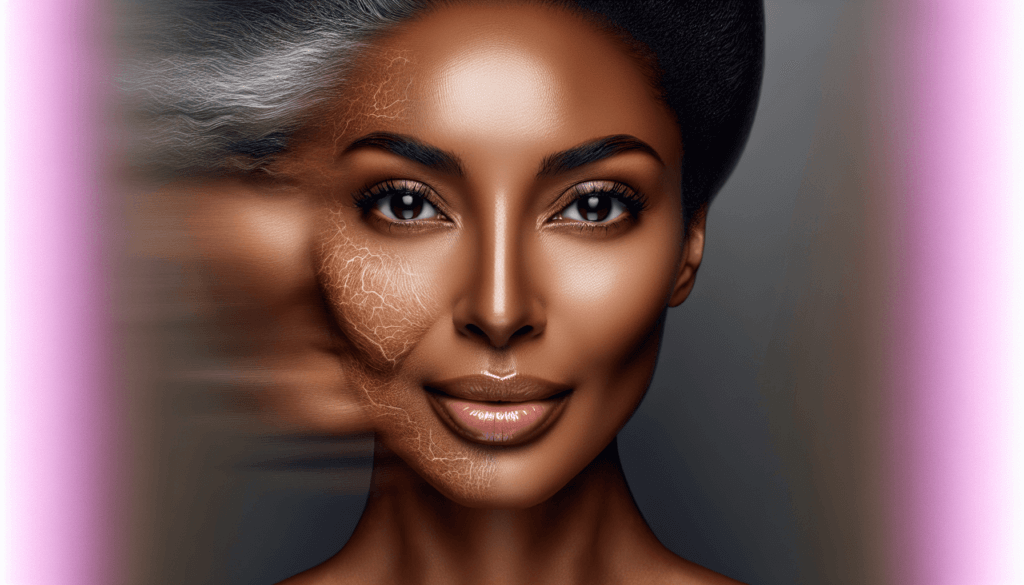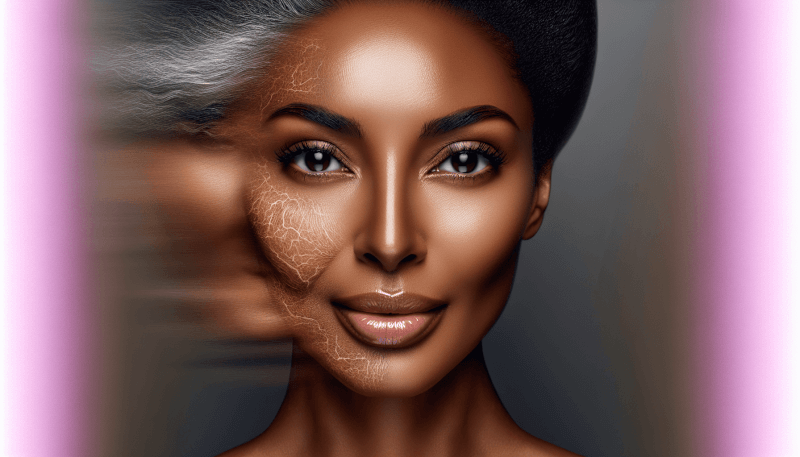Maintaining a youthful appearance is something we all desire, and with the right skincare routine, it is more achievable than ever before. From gentle cleansers to nourishing moisturizers, this article will guide you through the essential steps to keep your skin looking fresh, vibrant, and visibly younger. Discover the power of antioxidants, the importance of sun protection, and the benefits of regular exfoliation as we reveal age-defying skincare tips that will leave you feeling confident and radiant. So, let’s embark on this journey together, and unlock the secrets to a timeless beauty regimen.

Choosing the Right Products
Choosing the right products for your skincare routine can seem overwhelming with so many options available on the market. However, understanding your skin type and identifying your skin concerns is the first step to finding products that will work best for you.
Understanding Your Skin Type
Before you can choose the right products, it’s important to understand your skin type. There are four main skin types: oily, dry, combination, and normal. Oily skin is characterized by excess sebum production, while dry skin lacks moisture. Combination skin has both oily and dry areas, while normal skin is well-balanced.
To determine your skin type, pay attention to how your skin feels throughout the day. If it feels oily and looks shiny, you likely have oily skin. If your skin feels tight and looks flaky, you’re more likely to have dry skin. Combination skin may have an oily T-zone (forehead, nose, and chin) and dry or normal cheeks. Normal skin feels well-balanced with no excess oil or dryness.
Identifying Your Skin Concerns
Once you have a good understanding of your skin type, it’s important to identify your specific skin concerns. Do you struggle with acne or breakouts? Are you concerned about fine lines and wrinkles? Do you have hyperpigmentation or dark spots? Understanding your skin concerns will help you target those specific issues with the right products.
For acne-prone skin, look for products that contain salicylic acid or benzoyl peroxide to help control breakouts. If you’re concerned about signs of aging, products with ingredients like retinol, vitamin C, or peptides can help improve the appearance of fine lines and wrinkles. For hyperpigmentation, look for products that contain ingredients like niacinamide or hydroquinone to help lighten dark spots.
Researching Products and Ingredients
With so many products and ingredients to choose from, it’s essential to do your research before making a purchase. Look for products that are formulated for your specific skin type and address your concerns. Read reviews from other users to get an idea of how well the product has worked for them.
When it comes to ingredients, understanding what they do and how they can benefit your skin is key. Some ingredients may be more effective for certain skin types or concerns, so make sure to choose products that contain ingredients that will target your specific needs.
Daily Skincare Routine
Establishing a daily skincare routine is crucial for maintaining healthy, youthful-looking skin. This routine should include cleansing, toning, moisturizing, and applying sunscreen.
Cleansing
Cleansing is the first step in any skincare routine. It helps remove dirt, oil, and impurities from the skin, preventing clogged pores and breakouts. Choose a gentle cleanser that is suitable for your skin type and use it morning and evening to keep your skin clean and refreshed.
Toning
Toning is an often overlooked step in skincare, but it can make a big difference in the appearance of your skin. Toners help balance the skin’s pH levels and remove any remaining traces of dirt or impurities after cleansing. They can also provide a boost of hydration and prepare the skin for the next steps in your routine. Look for toners that are alcohol-free and suitable for your skin type.
Moisturizing
Moisturizing is essential for keeping the skin hydrated and nourished. Even if you have oily skin, it’s important to use a moisturizer to prevent dehydration and maintain the skin’s natural moisture barrier. Choose a moisturizer that is lightweight and non-greasy for oily or combination skin, and a richer formula for dry skin.
Applying Sunscreen
Applying sunscreen is one of the most important steps in your skincare routine, as it helps protect your skin from harmful UV rays that can cause premature aging and skin damage. Look for a broad-spectrum sunscreen with an SPF of 30 or higher and apply it generously to all exposed areas of your body. Reapply every two hours, or more frequently if you are sweating or swimming.

Weekly Skincare Treatments
In addition to your daily skincare routine, incorporating weekly skincare treatments can give your skin an extra boost and help address specific concerns.
Exfoliation
Exfoliation is the process of removing dead skin cells from the surface of the skin, revealing a brighter and smoother complexion. There are two types of exfoliation: physical and chemical. Physical exfoliation involves using a scrub, brush, or exfoliating tool to manually remove dead skin cells. Chemical exfoliation, on the other hand, involves the use of acids or enzymes to dissolve the bonds between dead skin cells. Choose an exfoliation method that is suitable for your skin type and use it once or twice a week.
Face Masks
Face masks are a great way to pamper your skin and address specific concerns. There are different types of face masks available, including clay masks, sheet masks, and gel masks. Clay masks help absorb excess oil and draw out impurities, while sheet masks provide hydration and nourishment. Gel masks are soothing and cooling, making them ideal for sensitive or irritated skin. Choose a face mask that suits your needs and use it once or twice a week for a spa-like treatment at home.
Serums
Serums are concentrated formulations that contain active ingredients designed to target specific skin concerns. They have a lightweight texture and are easily absorbed into the skin, making them ideal for delivering potent ingredients. Whether you’re looking to reduce the appearance of wrinkles, brighten your complexion, or improve the overall texture of your skin, there is a serum out there for you. Choose a serum that contains ingredients that address your specific concerns and apply it after cleansing and toning.
Specialized Skincare Techniques
In addition to daily skincare and weekly treatments, specialized skincare techniques can further enhance the effectiveness of your routine.
Facial Massage
Facial massage is a technique that involves using gentle pressure and strokes to stimulate blood circulation, promote lymphatic drainage, and relax facial muscles. It can help improve the absorption of skincare products and give your skin a healthy glow. There are various techniques you can try, such as using your fingertips to massage your face in circular motions or using a jade roller to cool and soothe the skin.
Microcurrent Facials
Microcurrent facials are a non-invasive treatment that uses low-level electrical currents to stimulate the muscles and tighten the skin. This technique can help improve the appearance of fine lines and wrinkles, lift sagging skin, and improve facial contours. Microcurrent facials can be done at home with a handheld device or by a professional in a spa or clinic.
LED Light Therapy
LED light therapy is a skincare treatment that uses different wavelengths of light to target specific skin concerns. Red light stimulates collagen production, reduces inflammation, and improves overall skin tone. Blue light kills acne-causing bacteria and helps control breakouts. Green light targets hyperpigmentation and reduces redness. LED light therapy can be done at home with a handheld device or at a professional spa or clinic.

Lifestyle Factors
In addition to a consistent skincare routine and specialized techniques, several lifestyle factors can contribute to healthy, youthful-looking skin.
Importance of a Healthy Diet
A healthy diet plays a significant role in the overall health of your skin. Eating a balanced diet that includes fruits, vegetables, lean proteins, and whole grains can provide your skin with essential vitamins, minerals, and antioxidants. These nutrients help protect your skin from free radicals, promote collagen production, and improve overall skin health.
Hydration
Staying hydrated is crucial for maintaining healthy skin. Drinking an adequate amount of water throughout the day helps flush out toxins and keeps your skin hydrated from the inside out. Aim to drink at least eight glasses of water per day, and more if you are physically active or live in a hot climate.
Exercise
Regular exercise not only benefits your overall health but also promotes healthy skin. Physical activity increases blood circulation, which helps deliver essential nutrients and oxygen to the skin. It also helps flush out toxins and can improve the appearance of your complexion. Aim for at least 30 minutes of moderate exercise most days of the week.
Stress Management
Managing stress is important for both your mental and physical well-being, including your skin. When you’re stressed, your body produces more cortisol, a hormone that can contribute to inflammation and breakouts. Finding healthy ways to manage stress, such as practicing yoga, meditation, or engaging in hobbies, can help promote healthy skin.
Maintenance and Prevention
In addition to a regular skincare routine and healthy lifestyle habits, there are other steps you can take to maintain and prevent skin damage.
Regular Dermatologist Visits
Regular visits to a dermatologist are essential for maintaining the health of your skin. A dermatologist can assess your skin, address any concerns or issues, and recommend appropriate treatments or products. They can also perform skin cancer screenings and provide guidance on sun protection.
Protecting Your Skin from Environmental Factors
Environmental factors such as pollution, UV rays, and harsh weather can contribute to skin damage and premature aging. Protect your skin by wearing sunscreen every day, even on cloudy days, and avoiding excessive sun exposure. Use protective clothing, such as hats and sunglasses, and seek shade when the sun is at its strongest. Additionally, consider using products with antioxidants that can help protect your skin against free radicals caused by pollution.
Taking Care of Your Overall Health
Your overall health plays a significant role in the appearance of your skin. Poor lifestyle habits, such as smoking and excessive alcohol consumption, can contribute to premature aging and skin damage. Quitting smoking and moderating alcohol intake can significantly improve the health and appearance of your skin.

Incorporating Anti-Aging Ingredients
As you age, incorporating anti-aging ingredients into your skincare routine can help maintain a youthful appearance.
Retinol
Retinol, a derivative of vitamin A, is a potent ingredient that helps reduce the appearance of fine lines and wrinkles. It promotes cell turnover, stimulates collagen production, and smooths the skin’s texture. Start by using a low concentration retinol product and gradually increase the strength as your skin adjusts.
Vitamin C
Vitamin C is a powerful antioxidant that helps brighten the skin, reduce hyperpigmentation, and boost collagen production. It also helps protect the skin against environmental damage. Look for products that contain stable forms of vitamin C, such as ascorbic acid or sodium ascorbyl phosphate, for maximum efficacy.
Hyaluronic Acid
Hyaluronic acid is a hydrating ingredient that can hold up to 1000 times its weight in water. It helps plump the skin, reduce the appearance of fine lines and wrinkles, and improve overall hydration. Look for serums or moisturizers that contain hyaluronic acid to boost moisture levels in your skin.
Peptides
Peptides are amino acids that help stimulate collagen production and improve the skin’s elasticity. They can help reduce the appearance of fine lines and wrinkles and enhance the overall firmness of the skin. Look for products that contain peptides to address signs of aging and promote a youthful appearance.
Skincare Mistakes to Avoid
While it’s important to take care of your skin, there are also several skincare mistakes to avoid.
Overwashing the Face
Overwashing the face can strip the skin of its natural oils and disrupt its moisture balance. Avoid washing your face excessively, especially with harsh cleansers. Stick to cleansing twice a day with a gentle cleanser that is suitable for your skin type.
Using Harsh Products
Using harsh products can irritate the skin and cause dryness or inflammation. Avoid products that contain alcohol, fragrances, or other potential irritants. Opt for gentle, non-irritating formulations that are suitable for your skin type.
Neglecting the Neck and Hands
The neck and hands are often neglected when it comes to skincare, but they are just as susceptible to aging and sun damage as the face. Remember to extend your skincare routine to these areas by cleansing, moisturizing, and applying sunscreen.

Customizing Your Routine
As your skin changes over time, it’s important to customize your skincare routine to address your specific age and skin needs.
Considering Age and Skin Needs
As you age, your skin’s needs may change. For example, mature skin may require more hydration and targeted ingredients to address signs of aging. Evaluate your skin regularly and adjust your routine accordingly. Consider incorporating additional anti-aging products or treatments as needed.
Adding or Eliminating Steps
Depending on your skin’s needs, you may need to add or eliminate steps from your skincare routine. For example, if you’re struggling with breakouts, you may need to incorporate acne-fighting products. If your skin is well-balanced and doesn’t have specific concerns, you can keep your routine simpler. Pay attention to how your skin responds to different products and adjust accordingly.
The Role of Genetics
Genetics plays a significant role in the health and appearance of your skin. Understanding your genetic predispositions can help you tailor your skincare routine to address specific concerns or conditions.
Understanding Genetic Factors
Genetic factors can influence various aspects of your skin, such as its texture, elasticity, and tendency to develop certain conditions. For example, certain genes may make you more susceptible to acne, while others may predispose you to fine lines and wrinkles. Understanding your genetic factors can help you choose products and treatments that specifically target these concerns.
Tailoring Skincare to Genetic Predispositions
Once you understand your genetic predispositions, you can tailor your skincare routine to address those specific concerns. For example, if you have a genetic tendency for acne, you can choose products that contain ingredients like salicylic acid or benzoyl peroxide to help control breakouts. If fine lines and wrinkles run in your family, you can focus on incorporating anti-aging ingredients like retinol or peptides into your routine.
By understanding your skin type, identifying your skin concerns, researching products and ingredients, and establishing a comprehensive skincare routine, you can achieve and maintain a youthful appearance. Incorporate specialized techniques, follow healthy lifestyle habits, and consider your genetic predispositions to create a customized skincare routine that will keep your skin looking its best for years to come. Remember, consistency is key, so commit to a routine that works for you and stick with it to achieve the best results.


